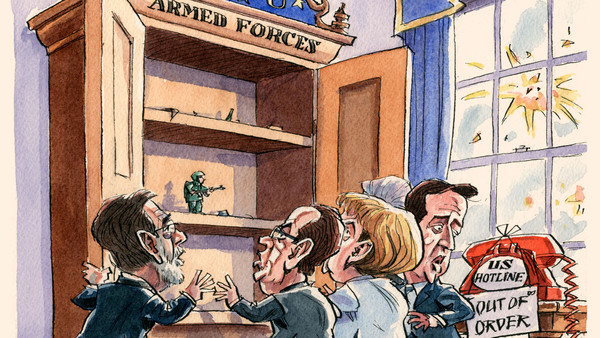From Gideon Rachman, Financial Times: It is true that there are many troops from European countries deployed in Afghanistan, and the French are in Mali. But, behind the headlines, military capacity is shrinking.
Since 2008, in response to the economic downturn, most big European countries have cut defence spending by 10-15 per cent. The longer-term trends are even more striking. Britain’s Royal Air Force now has just a quarter of the number of combat aircraft it had in the 1970s. The Royal Navy has 19 destroyers and frigates, compared with 69 in 1977. The British army is scheduled to shrink to 82,000 soldiers, its smallest size since the Napoleonic wars. In 1990 Britain had 27 submarines (excluding those that carry ballistic missiles) and France had 17. The two countries now have seven and six respectively. . . .
The situation in most other European countries is worse – Spain devotes less than 1 per cent of GDP to military spending. And much European military spending goes on pensions or pay, not equipment. The Belgians distinguished themselves in the Libyan campaign of 2011. But about 75 per cent of Belgian military spending now goes on personnel – causing one critic to call the Belgian military “an unusually well-armed pension fund”.
None of this might matter much if the US was still willing to step in whenever the Europeans fell short. In fact, America is losing patience with Europe’s inability to act on its own. The Obama administration was clearly reluctant to get involved in Libya. And when the French found that they needed American help on air-to-air refuelling for the Mali operation, they were aghast to discover that the Americans initially wanted to charge them. . . .
One day, perhaps soon, the Europeans may wake up and find that the US military is simply not there to deal with whatever threat is lapping at the frontiers of Europe. . . .
[Y]ou do not have to look very far beyond Europe’s borders to see an array of potential threats massing over the next decade. The Middle East is in turmoil and thousands are dying in Syria, threatening the stability of the whole region. Iran’s nuclear programme could well lead to confrontation and threaten European energy supplies. Russian military spending is rising. And growing tensions between China and its neighbours could one day menace the freedom of navigation on which European trade depends.
The risk is that Europeans may suddenly find that they need armed forces, after all – only to discover that they are not there any more. (graphic: Financial Times)
Image: ft%202%2019%2013%20Europe's%20empty%20defense%20cupboard.jpg

